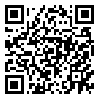Volume 7, Issue 2 (volume7, Issue 2 2019)
CPJ 2019, 7(2): 33-50 |
Back to browse issues page
Download citation:
BibTeX | RIS | EndNote | Medlars | ProCite | Reference Manager | RefWorks
Send citation to:



BibTeX | RIS | EndNote | Medlars | ProCite | Reference Manager | RefWorks
Send citation to:
Noruzi A, Moradi A, Zamani K, Hasani J. Comparison of the effectiveness of LogoTherapy Based on Rumi's Thoughts with Acceptance and Commitment Therapy on the Autobiographical Memory of the elderly. CPJ 2019; 7 (2) :33-50
URL: http://jcp.khu.ac.ir/article-1-3194-en.html
URL: http://jcp.khu.ac.ir/article-1-3194-en.html
, asg.noruzi@yahoo.com
Abstract: (7085 Views)
The purpose of the present study was to compare the effectiveness of logotherapy based on Rumi's thoughts and acceptance and commitment therapy on the elderly's autobiographical memory. The research method was semi-experimental with pre-test and post-test design and the follow-up period. The sample consisted of 66 older people (46 females and 20 males) referred to daily rehabilitation centers of Sari city, who were selected by available sampling method and were randomly divided into two experimental and one control group. The semi-structured autobiographical memory interview was used to collect data. For the first experimental group, logotherapy based on Rumi's thoughts and for the second experimental group, Acceptance and Commitment Therapy, each was provided for 8 sessions of 75 minutes, during which the control group received no intervention. The results of the repeated measures analysis of variance showed that logotherapy based on Rumi's thoughts and acceptance and commitment therapy improved autobiographical memory and its components in the elderly. The results also showed that there was a significant difference between the effectiveness of the two groups of logotherapy based on Rumi's thoughts and Acceptance and Commitment Therapy, so that logotherapy based on Rumi's thoughts was more effective on the autobiographical memory of elderly.
Keywords: logotherapy based on Rumi's thoughts, acceptance and commitment therapy, autobiographical memory, elderly, culture.
Type of Study: Research |
Subject:
Special
Received: 2019/12/26 | Accepted: 2020/02/19 | Published: 2020/02/24
Received: 2019/12/26 | Accepted: 2020/02/19 | Published: 2020/02/24
Send email to the article author
| Rights and permissions | |
 |
This work is licensed under a Creative Commons Attribution-NonCommercial 4.0 International License. |






